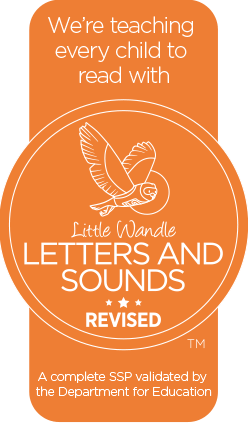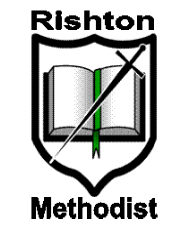Reading and Phonics
At Rishton Methodist Primary School, we put English at the centre of every child’s learning. We recognise the significance of language, communication, reading and writing in all aspects of life, from developing independent learning skills to successfully entering the world of work. We place high-quality texts at the heart of our curriculum and encourage children to develop their love of reading through our Reading for Pleasure initiatives. Experiential learning opportunities and a vocabulary-rich learning environment feed directly into children’s writing outcomes.
The overarching aims of our English curriculum are to:
- Develop strong oracy skills that allow children to express themselves, communicating confidently across a range of contexts.
- Enable children to read fluently, widely and often, understanding a wide range of texts appropriate for their age.
- Enable children to draft, edit and present writing that is both technically proficient and creative, tailored to the demands of purpose and audience.
- Enable children to have a solid understanding of grammar and be able to spell new words by effectively applying the spelling patterns and rules they learn throughout their time in primary school.
- Encourage confidence and enjoyment in speaking, listening, reading and writing.
Underpinning our English curriculum are some core principles:
- Has high expectations of all children.
- Consciously builds on children’s existing language and literacy experiences.
- Recognises the importance of all those involved in the learning experience – parents and carers, wider family members, teachers and children.
- Values diversity and is culturally inclusive.
- Values and promotes critical enquiry.
- Offers challenge but provides models, demonstrations, examples and scaffolds to help children tackle them successfully.
All aspects of our English curriculum are interrelated, and progress in one area is supported by development in each of the others. At Rishton Methodist, we acknowledge the strong reciprocal relationship between speaking, listening, reading and writing.
At Rishton Methodist Primary School we believe that all pupils can achieve in Reading, both for pleasure and in their comprehension and fluency. We do not put ceilings on what pupils can achieve and we do not hold pre-conceptions about any pupils’ ability to make progress. We believe through reading, pupils will have a chance to develop culturally, emotionally, intellectually, socially and spiritually. We feel that reading enables pupils both to acquire knowledge and to build on what they already know.
Phonics
Our Phonics Curriculum comes from the Department for Education Letters and Sounds in conjunction with Little Wandle.
In Early Years and Key Stage 1, early word reading is taught through a systematic synthetic phonics programme (Little Wandle) which has been carefully designed to best meet the needs of the children at Rishton Methodist. Children in Reception will be taught through pacey and engaging, direct, daily teaching sessions and will begin to learn a defined group of grapheme-phoneme correspondences.
Alongside this, children are taught how to read printed words by identifying and blending individual phonemes from left to right all through the word, as well as the skill of segmenting spoken words into their constituent phonemes for spelling. The children are also taught to decode and spell common exception words (‘tricky words’). As the children progress through Year 1 and Year 2, they move from simple to more complex phonic knowledge and skills.
The texts and books the children are asked to read are composed almost entirely of words made up of grapheme-phoneme correspondences that a child has learnt up to that point, apart from a few common exception words.
As part of the programme, the children are taught how to form lower-case and capital letters correctly with clear start and finish points. To support this, we use mnemonic phrases to help the children build a mind picture of the letter formation. The children are then taught to write words made up of the learnt grapheme-phoneme correspondences and then simple sentences composed of these words, as well as any common exception words learnt.
Clear progression and assessment criteria enable teaching staff to monitor the children’s progress closely, and we use the Little Wandle structured interventions to ensure any child in danger of falling behind is able to keep up. Children with specific learning or speech and language difficulties are supported by the Special Educational Needs co-ordinator.
Alongside this, we develop children’s knowledge and understanding of ‘concepts about print’. Developing print awareness or concepts about print is understanding that print is organised in a particular way — for example, knowing that print is read from left to right and top to bottom. It is knowing that words consist of letters and that spaces appear between words.
Please see useful phonics videos can be found below:
- Reception Phase two sounds - Autumn one clip.
- Reception Phase two sounds - Autumn two clip.
- Little Wandle parent website - Click Here

